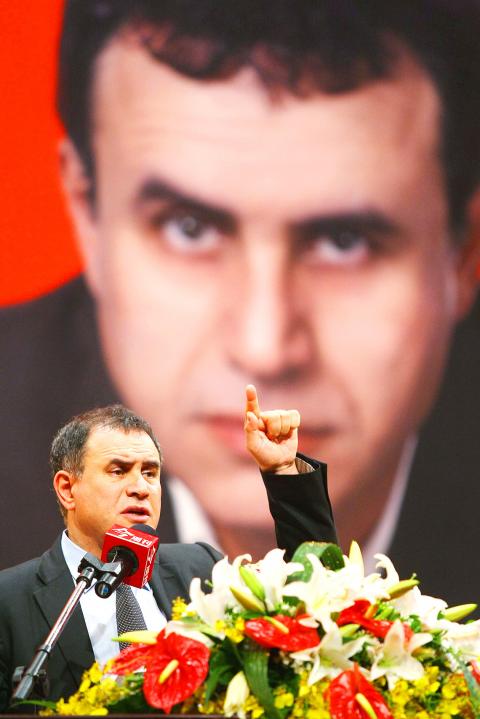Massive capital inflows pose the biggest challenge to emerging economies, including Taiwan’s, because in recent months their currencies have strengthened against the US dollar and the competitiveness of their exports could be jeopardized if the trend continues unchecked, US economist Nouriel Roubini said yesterday in Taipei.
Roubini, an economics professor at New York Unviersity and dubbed “Dr Doom” for his pessimistic forecasts, said that while emerging economies in Asia have stronger economic fundamentals than other countries, uncertainties remain about their overall economic outlook.
THWARTED HOPES

Photo: CNA
The renowned economist cited asset bubbles, China’s potential overheating economy and regional central banks’ policy responses as possible risks that may thwart hopes of a V-shaped recovery.
“How to manage massive capital inflows is the biggest challenge for central banks in the region,” Roubini said during a speech organized by the Chinese-language Business Today (今周刊) weekly.
If left unaddressed, currencies in export-driven economies such as Taiwan and other Asian countries will gain value, driven by an influx of global funds to exploit their economic growth and higher yields, he said.
This trend is evident after the US announced a second round of quantitative easing to avoid a double-dip recession, Roubini said, adding that to achieve this goal, the US Federal Reserve may inject more liquidity into the market and Europe may take similar steps.
‘CONSUME LESS’
“Advanced economies will have to spend less, consume less, import less and save more for years to put the economy back on track,” he said. “The monetary easing came after inflation readings stood below the central bank’s target.”
Roubini said the policy stance is necessary from a global perspective because the East has not fully decoupled its economic dependence from the West, although the level of reliance has eased.
This interdependence explained why Europe’s debt problems prompted corrections in stock markets across the world earlier this year, he said.
EUROZONE CONCERN
Regarding the current debt crisis in Europe, Roubini said there was a risk of the problem spreading to Portugal and Spain. The rising budget deficits in the eurozone are a concern, he added.
“There’s now financial contagion in Portugal, Spain and to a smaller degree even in countries like Italy, Belgium and others in the eurozone,” Roubini said.
Addressing the issue of capital inflows, he said currency intervention without interest rate hikes may increase bubble pressures as central banks pump more money into the market to support the US dollar.
Stabilizing intervention, or intervention measures that were used to stabilize exchange rates, have led to more inflows of hot money, Roubini said.
Taiwan recently tightened rules governing purchases of government debts by foreign investors to curb hot money inflows.
DIVERSIFY
Roubini said an open economy coupled with sound fundamentals is the best way to absorb external shocks. He advised investors to maintain a diversified portfolio across regions to lower investment risks.
Taiwan Semiconductor Manufacturing Co (TSMC, 台積電) chairman Morris Chang (張忠謀), who joined a panel discussion following Roubini’s speech, said he hoped the central bank would ensure that any appreciation in the local currency would be gradual.
Exporters could cope with slower appreciation more easily than a sudden rise, Chang said. TSMC is the world’s largest contract chipmaker.
Additional reporting by Bloomberg

The US dollar was trading at NT$29.7 at 10am today on the Taipei Foreign Exchange, as the New Taiwan dollar gained NT$1.364 from the previous close last week. The NT dollar continued to rise today, after surging 3.07 percent on Friday. After opening at NT$30.91, the NT dollar gained more than NT$1 in just 15 minutes, briefly passing the NT$30 mark. Before the US Department of the Treasury's semi-annual currency report came out, expectations that the NT dollar would keep rising were already building. The NT dollar on Friday closed at NT$31.064, up by NT$0.953 — a 3.07 percent single-day gain. Today,

‘SHORT TERM’: The local currency would likely remain strong in the near term, driven by anticipated US trade pressure, capital inflows and expectations of a US Fed rate cut The US dollar is expected to fall below NT$30 in the near term, as traders anticipate increased pressure from Washington for Taiwan to allow the New Taiwan dollar to appreciate, Cathay United Bank (國泰世華銀行) chief economist Lin Chi-chao (林啟超) said. Following a sharp drop in the greenback against the NT dollar on Friday, Lin told the Central News Agency that the local currency is likely to remain strong in the short term, driven in part by market psychology surrounding anticipated US policy pressure. On Friday, the US dollar fell NT$0.953, or 3.07 percent, closing at NT$31.064 — its lowest level since Jan.

The New Taiwan dollar and Taiwanese stocks surged on signs that trade tensions between the world’s top two economies might start easing and as US tech earnings boosted the outlook of the nation’s semiconductor exports. The NT dollar strengthened as much as 3.8 percent versus the US dollar to 30.815, the biggest intraday gain since January 2011, closing at NT$31.064. The benchmark TAIEX jumped 2.73 percent to outperform the region’s equity gauges. Outlook for global trade improved after China said it is assessing possible trade talks with the US, providing a boost for the nation’s currency and shares. As the NT dollar

The Financial Supervisory Commission (FSC) yesterday met with some of the nation’s largest insurance companies as a skyrocketing New Taiwan dollar piles pressure on their hundreds of billions of dollars in US bond investments. The commission has asked some life insurance firms, among the biggest Asian holders of US debt, to discuss how the rapidly strengthening NT dollar has impacted their operations, people familiar with the matter said. The meeting took place as the NT dollar jumped as much as 5 percent yesterday, its biggest intraday gain in more than three decades. The local currency surged as exporters rushed to